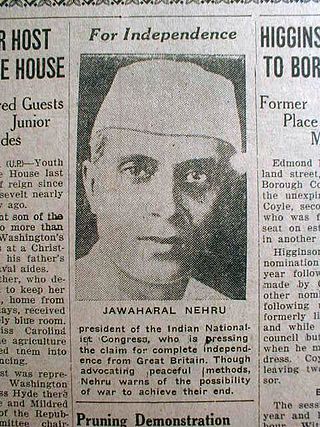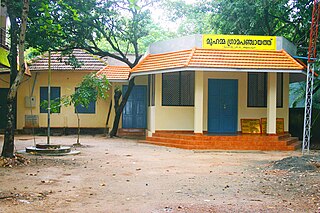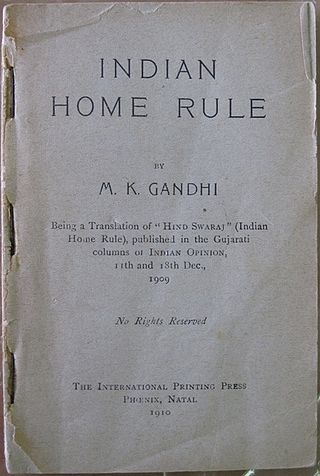Related Research Articles

The Salt march, also known as the Salt Satyagraha, Dandi March, and the Dandi Satyagraha, was an act of nonviolent civil disobedience in colonial India, led by Mahatma Gandhi. The 24-day march lasted from 12 March 1930 to 6 April 1930 as a direct action campaign of tax resistance and nonviolent protest against the British salt monopoly. Another reason for this march was that the Civil Disobedience Movement needed a strong inauguration that would inspire more people to follow Gandhi's example. Gandhi started this march with 78 of his trusted volunteers. The march spanned 387 kilometres (240 mi), from Sabarmati Ashram to Dandi, which was called Navsari at that time. Growing numbers of Indians joined them along the way. When Gandhi broke the British Raj salt laws at 8:30 am on 6 April 1930, it sparked large-scale acts of civil disobedience against the salt laws by millions of Indians.

A princely state was a nominally sovereign entity of the British Indian Empire that was not directly governed by the British, but rather by an Indian ruler under a form of indirect rule, subject to a subsidiary alliance and the suzerainty or paramountcy of the British crown.

Sir Tej Bahadur Sapru was an Indian freedom fighter, lawyer, and politician. He was a key figure in India's struggle for independence, helping draft the Indian Constitution. He was the leader of the Liberal party in British-ruled India.
Swarāj (Svarāja) sva "self", raj "rule") can mean generally self-governance or "self-rule". It was first used by Chhatrapati Shivaji Maharaj to attain self rule from the Mughal Empire and the Adilshahi Sultanate. Later, the term was used synonymously with "home-rule" by Maharishi Dayanand Saraswati and later on by Mahatma Gandhi, but the word usually refers to Gandhi's concept of Indian independence from foreign domination. Swaraj lays stress on governance, not by a hierarchical government, but by self-governance through individuals and community building. The focus is on political decentralisation. Since this is against the political and social systems followed by Britain, Gandhi's concept of Swaraj advocated India's discarding British political, economic, bureaucratic, legal, military, and educational institutions. S. Satyamurti, Chittaranjan Das and Motilal Nehru were among a contrasting group of Swarajists who laid the foundation for parliamentary democracy in India.
The Swaraj Party, established as the Congress-Khilafat Swaraj Party, was a political party formed in India on 1 January 1923 after the Gaya annual conference in December 1922 of the National Congress, that sought greater self-government and political freedom for the Indian people from the British Raj.

Uchharangrai Navalshankar Dhebar was an Indian Independence activist who served as the Chief Minister of Saurashtra State from 1948 to 1954 and the President of the Indian National Congress from 1955 to 1959.

The Deccan States Agency, also known as the Deccan States Agency and Kolhapur Residency, was a political agency of India, managing the relations of the Government of India with a collection of princely states and jagirs in western India.

The Declaration of Purna Swaraj was a resolution which was passed in 1930 because of the dissatisfaction among the Indian masses regarding the British offer of Dominion status to India. The word Purna Swaraj was derived from Sanskrit पूर्ण (Pūrṇa) 'Complete' and स्वराज (Svarāja) 'Self-rule or Sovereignty', or Declaration of the Independence of India, it was promulgated by the Indian National Congress, resolving the Congress and Indian nationalists to fight for Purna Swaraj, or complete self-rule/total independence from the British rule.

Panchayati raj is the system of local self-government of villages in rural India as opposed to urban and suburban municipalities.
Maurice Frydman, aka Swami Bharatananda, was an engineer and humanitarian who spent the later part of his life in India. He lived at the ashram of Mahatma Gandhi and took an active part in India's fight for independence—notably in helping to draft a new constitution for the State of Aundh that became the Aundh Experiment. He was a Polish Jew who subsequently converted to Hinduism.

Raja Sir Maharaj Singh was the first Indian Governor of Bombay. He was also the Prime Minister of Jammu and Kashmir during Maharaja Hari Singh's rule and also the Dewan of Jodhpur for a short while. Raja Sir Maharaja Singh served as the president of the All India Conference of Indian Christians in the 1940s. He was awarded a number of knighthoods in various orders of chivalry.

Hind Swaraj or Indian Home Rule is a book written by Mohandas K. Gandhi in 1909. In it he expresses his views on Swaraj, modern civilization, mechanisation, among other matters. In the book, Gandhi repudiates European civilization while expressing loyalty to higher ideals of empire. The book was banned in 1910 by the British government in India as a seditious text.
Parshuram Trimbak Kulkarni (1660–1718), popularly known as Parshuram Pant Pratinidhi, was a Minister (Pradhan) and Count (Sardar) of the Maratha Empire. He served as Pratinidhi during Rajaram I and Tarabai’s reign. His contribution to the War of 27 years is considered to be of vital importance. He was also the founder of the princely states of Vishalgad and Aundh in Maharashtra.
Pant Pratinidhi family is a prominent aristocratic noble family of India, who served as Pratinidhis to Chhatrapatis of Maratha Empire and later became rulers of the Princely states of Aundh and Vishalgad.

Bhawanrao Shriniwasrao Pant Pratinidhi,, popularly known as Balasaheb Pant Pratinidhi, or Bhawanrao Balasaheb Pant Pratinidhi, was the ruler of the princely state of Aundh during the British Raj, from 1909 until 1947.

Aundh State was a Maratha princely state during the British Raj, in the Deccan States Agency division of the Bombay Presidency.

Bhor State was one of the 9-gun salute Maratha princely states of Deccan States Agency. It was the only state belonging to the Poona Agency under the Bombay Presidency, which became later part of the Deccan States Agency. Along with Akkalkot State, Aundh State, Phaltan State and Jath State, it was one of the Satara Jagirs. The state merged with the newly independent Indian union in 1948.

Appasaheb Pant (1912–1992), also known as Apa Pant, Appa Pant, Appa Sahib Pant, Appsaheb Balasaheb Pant, Parashuram-rao Pant, was an Indian diplomat, Prince of Aundh, Gandhian, writer and freedom fighter. A philosopher by nature and a mystic at heart, who served for over forty years as a career diplomat for the Indian Government. He served as the Indian Commissioner at various African countries such as Kenya, Uganda, Tanganyika, Zanzibar, Northern Rhodesia, Southern Rhodesia, Nyasaland and the Belgian colony of the Congo and, later, as the Indian ambassador to countries like Indonesia, Norway, Egypt, United Kingdom and Italy.He also served as the Political Officer for India in the Kingdom of Sikkim. The Government of India honoured him in 1954, with the award of Padma Shri, the fourth highest Indian civilian award for his contributions to the society, placing him among the first recipients of the award.

The Panchayat raj is a political system, originating from the Indian subcontinent, found mainly in India, Pakistan, Bangladesh, Sri Lanka, and Nepal. It is one of the oldest systems of local government in the Indian subcontinent, and historical mentions date to around 250 CE. The word raj means 'rule' and panchayat means 'assembly' (ayat) of 'five' (panch). Traditionally, panchayats consisted of wise and respected elders chosen and accepted by the local community. These assemblies settled disputes between both individuals and villages. However, there were varying forms of such assemblies.
References
- Allen, Charles; Dwivedi, Sharada. Lives of the Indian Princes. London: Century Publishing (1984). ISBN 0-7126-0910-5.
- Alter, Joseph S. Gandhi's Body. University of Pennsylvania Press (2000). ISBN 978-0-8122-3556-2.
- Parel, Anthony. Gandhi, Freedom, and Self-Rule. Lexington Books (2000). ISBN 978-0-7391-0137-7.